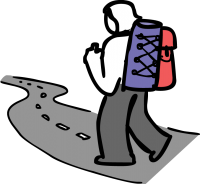 A journey of 1,000 miles begins with the first step. Taking that first step towards overcoming an obstacle can feel scary and intimidating. I remember the day I first realized I needed help. Married to an alcoholic, the disease had progressed to a place I could no longer handle on my own. I knew all my efforts to enable the alcoholic in my life were no longer working and I was left with two choices – get help or go down with the ship. I chose to get help but taking that first step was extremely difficult. Sitting alone in my kitchen it took two hours before I could summon the courage to pick up the phone and make the call that would change my life for the better. As scary as that first step can be, in this week’s Torah portion Lech Lecha, it doesn’t appear at all scary for Abraham. He doesn’t hesitate when God instructs him to: לֶךְ־לְךָ֛ מֵֽאַרְצְךָ֥ וּמִמּֽוֹלַדְתְּךָ֖ וּמִבֵּ֣ית אָבִ֑יךָ אֶל־הָאָ֖רֶץ אֲשֶׁ֥ר אַרְאֶֽךָּ Go forth from your native land and from your father’s house to the land that I will show you. (Gen. 12:1) Abraham doesn’t hesitate to pick himself up and go with his family to an unrevealed destination – a destination to be determined by God. He packs his bags and with his entire family-- his wife Sarah, his nephew Lot, and all his followers, embarks on what will be a most important journey. Maybe it helped that he wasn’t going alone and maybe his wealth made the journey easier. On the other hand, traveling with so many people and so many belongings could only make the journey more complicated. Either way, Abraham doesn’t hesitate. As the father of monotheism, he makes the decision to turn towards the one God and turn away from the idol-worshipping gods of his past. Journeys are intentional efforts to move beyond ourselves. When we embark on a journey we venture into unfamiliar territory in order to seek new challenges and find new answers. Like Abraham, we may not know what is out there when we embark on our journeys, but we are propelled by the opportunity to explore new worlds and ideas. Whether we are seeking a better life or just looking for an adventure, a journey of 1,000 miles begins with the first step. L’Shalom, Ellie 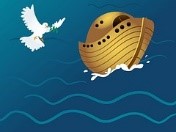 It isn't the load that weighs us down, it's the way we carry it Uncertainty, insecurity, and anxiety are all part of the human experience in general, but even more so for these past eight months. We are uncertain, insecure and anxious about the economy, our jobs, our finances, and of course our physical and mental health. These last eight months have also made it clear the two main ways people respond to uncertainty, insecurity and anxiety. In the case of the pandemic, many of us are listening to the experts while others are raging against the machine. Either way we are often left feeling stressed and powerless. This week’s Torah portion is named Noah, after the person who the Torah describes as the most righteous man of his generation. Righteous Noah follows God’s instruction to build an ark. Deeming the earth to be חמס, lawless and corrupt, God’s plan is to bring about a flood that would destroy all life on earth. In the meantime, Noah, his family and two of every animal will be safely ensconced in the ark. When the flood subsides, Noah comes out of the ark and offers sacrifices to God and God establishes a covenant with Noah and his sons. However, viewing the devastation wreaked by the flood, he decides to plant a vineyard rather than say, vegetables. Noah then harvests the grapes, makes wine, and becomes the first man in the Bible to get drunk. Noah doesn’t rage against the machine but he does hide from it. Viewing the devastation brought on by the flood, he chooses alcohol as a way to cope with his feelings of uncertainty, insecurity and anxiety about the future. Perhaps Noah felt weighed down with a burden of guilt for having survived when the entire earth was destroyed. But, in choosing to hide rather than face the challenge of that devastation, Noah fails to understand that it isn’t the load that weighs us down, it’s how we carry it. Shabbat Shalom, Ellie 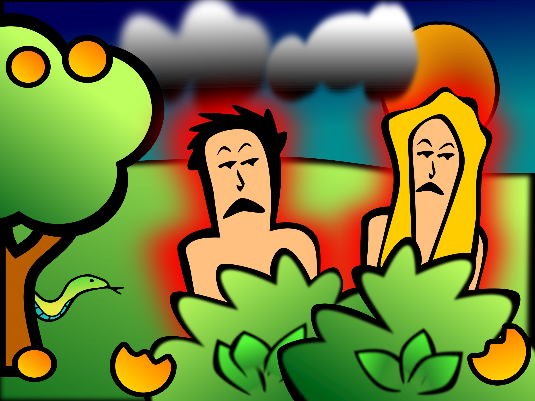 It's a Simple Program for Complicated People Life is complicated. If you didn’t believe that before, I’m guessing recent world events have convinced you otherwise. But, as complicated as life tends to be, we humans have a way of adding to that complication. We think we are satisfied but then someone offers to sell us the Brooklyn Bridge and all hell breaks loose. As we begin our Torah reading cycle one more time, we read yet again the story of creation. God creates the world, including man and woman—Adam and Eve. It’s a simple idea; seemingly simple for God to execute and simply miraculous for us humans. God even gives Adam a simple instruction about life in the garden of Eden: מִכֹּ֥ל עֵץ־הַגָּ֖ן אָכֹ֥ל תֹּאכֵֽל: וּמֵעֵ֗ץ הַדַּ֨עַת֙ ט֣וֹב וָרָ֔ע לֹ֥א תֹאכַ֖ל מִמֶּ֑נּוּ כִּ֗י בְּי֛וֹם אֲכָלְךָ֥ מִמֶּ֖נּוּ מ֥וֹת תָּמֽוּת: Of every tree of the garden you are free to eat; but as for the tree of knowledge of good and bad, you must not eat of it; for as soon as you eat of it, you shall die.” (Gen. 2:16). Commentators interpret this to mean that eating from the tree wouldn’t immediately result in death but rather Adam and Eve would become mortal and eventually die. But then walks in the serpent who makes a Brooklyn Bridge pitch to Eve. The serpent dismisses her fears and promises oh so convincingly that eating the fruit of the tree would not result in death but would allow Eve to become like a divine being –like God. Eve and then Adam take the bait and the rest is history. God’s simple and simply beautiful creation almost immediately spawns problematic beings. Right off the bat the Torah makes clear the essence of being human – we are complicated. So, there you have it—creation, a simple program for complicated people. Shabbat Shalom. Ellie 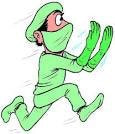 Yom Kippur Morning Sacrifice Highway 61 by Bob Dylan. Oh God said to Abraham, “Kill me a son” Abe says, “Man, you must be puttin’ me on” God say, “No.” Abe say, “What?” God say, “You can do what you want Abe, but The next time you seem me comin’ you better run” Well Abe says, “Where do you want this killin’ done?” God says, “Out on Highway 61.” In his classic folk song Highway 61 Revisited, Bob Dylan found inspiration in the biblical story of the Akeidah, the binding of Isaac – the story we read on the second day of RH. As a test of faith, God tells Abraham to take his favored son, Isaac to the top of a mountain in the land of Moriah and offer him as a sacrifice to God. In Dylan’s version, God tells Abraham to sacrifice his son on Highway 61, known as the Blues Highway, extending from Minnesota to New Orleans. In the Torah, Abraham complies, and God rewards him by refusing to accept the sacrifice God had asked for, and instead promising to bless Abraham and his descendants, כְּכֽוֹכְבֵ֣י הַשָּׁמַ֔יִם וְכַח֕וֹל אֲשֶׁ֖ר עַל־שְׂפַ֣ת הַיָּ֑ם וְהַרְבָּ֨ה אַרְבֶּ֤ה אֶת־זַֽרְעֲךָ֙. and make your descendants as numerous as the stars of heaven and the sands on the seashore….. This notion of sacrifice has come into sharp focus for us these last seven months. In particular, we have heard and read countless stories about essential workers and the sacrifices they have been making in order to save lives and in order to provide for us during this pandemic. Unfortunately, we have not always provided for them in delivering enough personal protective equipment, supplies, and resources to do their jobs. Although like Abraham, they heard God’s call, unlike his son Isaac, many of these workers have made the ultimate sacrifice – dying in the service of their country. The Hebrew word for sacrifice korban, has evolved over time to be identified with three different but related meanings.[1] In its early use korban referred to “sacrificing to” something—in many cases God. The sacrifices made were gifts-- an object, usually an animal, which was transferred from the human to the divine realm. “Sacrificing to” was meant to be a solemn show of gratitude and/or communion. Later on the term was used more as “sacrificing for” -- giving up a vital interest for a higher cause, as in the story of Abraham, who was willing to give up his son for God, or as in essential workers who have been sacrificing themselves to help the country and mankind during the pandemic. “Sacrificing for” represents an offering made with the intention of achieving a particular purpose. The third meaning of korban used in modern Hebrew, symbolizes not only an offering but also a victim of a crime, who I suppose you could say sacrificed their life for no particular purpose other than helping their killer fulfill his or her desire to kill. In Judaism, the ritual of sacrifice reached an abrupt end with the destruction of the temple in Jerusalem during the first century. Christianity replaced all sacrifices with one ultimate sacrificial event: the sacrifice of the son of God. That sacrifice eclipsed all previous ones. Christianity did not do away with the idea of sacrifice; it founded itself on the supreme sacrifice.[2] In this morning’s Torah portion we read about two goats used by the High Priest in the sacrificial ceremony—one designated for God and one designated for Azazel. The goat designated for God was sacrificed to God on the altar and the goat designated for Azazel? Well, after the High Priest laid his hands on the goat and transferred the sins of the Israelites to that goat, it was sent out into the wilderness. This is the origin of the word scapegoat or scapegoating -- putting all the blame on someone or something. The scapegoat was sacrificed to the wilderness in order to save the Israelites from their sins. Could it be that the essential workers of COVID-19 are modern day scapegoats sent off into the wilderness to do the jobs we cannot do or in some cases aren’t willing to do, to save us? Each morning when I pray – when I daven – I read from a series of rabbinic texts designed for daily study. One of those texts comes from the Jerusalem Talmud (Berachot 2:1): Rabbi Shmuel bar Nahmani said: The Holy One said to David: Solomon your son, is building the Temple. Is this not for the purpose of offering sacrifices there? The justice and righteousness of your actions are more precious to Me than sacrifices. And how do we know this? [because it says in Proverbs] To do what is right and just is more desirable to Adonai than sacrifice (Proverbs 21:3) Of course, often times to do what is right and just, requires sacrifice. Whether that sacrifice means sitting on your couch, helping your neighbor, or sacrificing your life, to do what is right requires us to step outside our comfort zone or do what we need to do rather than what we want to do. Early in the pandemic there was a lot of discussion centered around making sacrifices for the sake of our economy. We should sacrifice the elderly, the disabled, the vulnerable, the infirm, minorities, working class poor-- for the sake of the economy. It wasn’t so much that people would die, it was more that people should die. In a tweet back in March, Texas Lt. Governor Dan Patrick wrote: Grandparents would be willing to die to save the economy for their grandchildren. More recently we’ve heard talk about herd “mentality” – or more correctly, herd immunity – the willingness of some to sacrifice millions of American lives as a path towards eradicating this virus. Herd immunity occurs when the herd, a large portion of a community becomes immune to a disease, making the spread of the disease from person to person less likely. However, the more contagious a disease is, the greater the proportion of the population that would need to be immune to stop the spread of the disease. Measles is a highly contagious illness and it's estimated that 94% of the population would have to be immune to interrupt the chain of transmission. With COVID-19 experts estimate that in the U.S., 70% of the population — more than 200 million people — would have to recover from COVID-19 to halt the epidemic. Millions of people would die before reaching herd immunity. Both Sweden and Britain pursued this strategy early on but abandoned it when officials saw it would not work. In addition, it isn’t yet clear whether being infected with the virus would make someone immune to future infection. We have all made sacrifices during this pandemic and we will need to continue to do so for the foreseeable future. In March and April, The Rutland Jewish Center celebrated two Zoom Bar Mitzvahs and as it happens both Torah portions, coming from the book of Leviticus, were focused on sacrifices. If you aren’t connecting to my words about sacrifice, maybe listening to some of what Sam and Ezra spoke about will do it for you. Sam wrote: Sometimes …. we make sacrifices to benefit others……So here’s a challenge I pose to you. Try making a sacrifice today and every day to better the world. It can be small like taking the time out of your day to say kind words to a stranger or something as large as sacrificing your hard earned money and donating it to a charity. It doesn't matter what you do. The only thing that matters is that you do it. Ezra interpreted sacrifice as being about rules: Modern society often rebels against being told what to do…... We like spontaneity and freedom more than rules. Rules can be hard and annoying like having to wake up at a certain time for school, and being marked tardy when you are 30 seconds late…….. Lots of rules are hard to follow. But rules aren’t all bad, they can help us know what to do especially in new situations. For example, we are all facing new rules today like not having large gatherings to prevent the spread of the virus. The rules help us know what to do. COVID-19 is one of a number of crises facing us right now, but as both Sam and Ezra noted, you don’t have to be a first responder or an essential worker to make a sacrifice and help the world during these difficult times. It doesn’t matter where you offer your sacrifice -- on Mount Moriah, on Highway 61 or in Rutland, Vermont. It doesn’t matter if you choose to do it out of faith; out of a sense of duty; out of a desire to make a difference, or because it’s the right thing to do, the world needs you. So just do it. Make that sacrifice but more importantly, do what is right and just, because: To do what is right and just is more desirable to Adonai than sacrifice (Proverbs 21:3) I began with the words of Bob Dylan and I will end with the words of Bob Dylan: Blowin in the Wind by Bob Dylan How many times must a man look up Before he can see the sky? Yes, 'n' how many ears must one man have Before he can hear people cry? Yes, 'n' how many deaths will it take 'til he knows That too many people have died? The answer, my friend, is blowin' in the wind The answer is blowin' in the wind G’mar Chatima Tova, Wishing you all an easy fast. [1] Moshe Halbertal. On Sacrifice. (Princeton : Oxford University Press, c2012) 1 [2] Ibid. 7 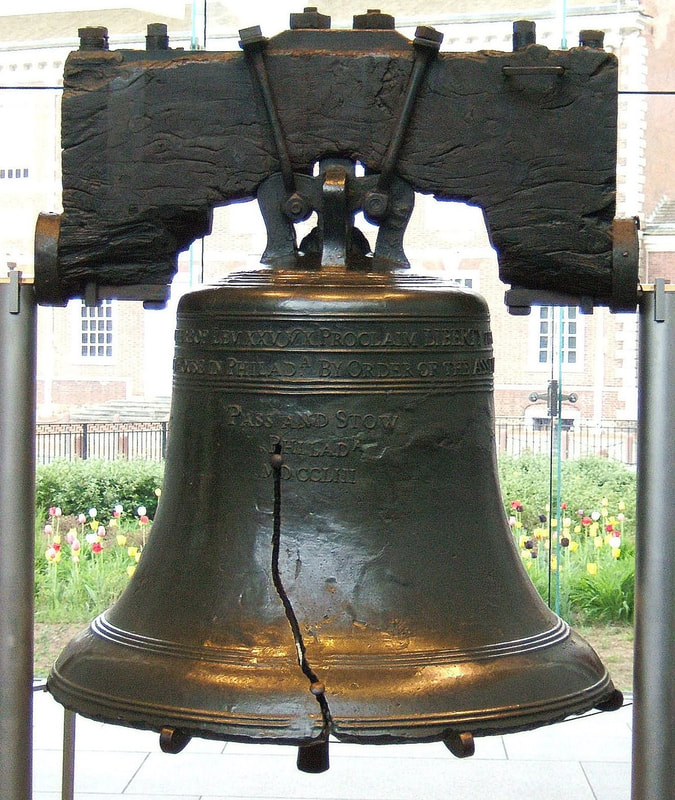 Kol Nidre Evening 5781 Freedom Power and glory by Phil Ochs Come and take a walk with me through this green and growing land Walk through the meadows and the mountains and the sand Walk through the valleys and the rivers and the plains Walk through the sun and walk through the rain Here is a land full of power and glory Beauty that words cannot recall Oh her power shall rest on the strength of her freedom Her glory shall rest on us all (on us all) In the book of Exodus, we read the story of Passover. We read about the Israelites’ exit from Egypt. After 400 years of slavery they finally have their first taste of freedom. So, what do they do with that first taste of freedom? Well, technically they celebrate by dancing and playing timbrels. I’ll give ‘em that. But three days later, when they arrive at Marah in the wilderness, they find the water tastes bitter. So, they complain. They whine. They pitch a fit. Ok, that’s understandable. The water tasted bitter. That would be disappointing after coming out of slavery. Then, not long after that, they come to the wilderness of Sin, on the fifteenth day of the second month after their departure from Egypt. (Ex. 16:1) They walk through a land filled with power and glory as written by Phil Ochs in the song I just sang, beauty that words cannot recall. Phil Ochs wrote those words about America but they fit just fine here. Oh her power shall rest on the strength of her freedom, her glory shall rest on us all. And what did the Israelites say in response to their new found freedom: מִֽי־יִתֵּ֨ן מוּתֵ֤נוּ בְיַד־יְיָ֙ בְּאֶ֣רֶץ מִצְרַ֔יִם בְּשִׁבְתֵּ֨נוּ֙ עַל־סִ֣יר הַבָּשָׂ֔ר בְּאָכְלֵ֥נוּ לֶ֖חֶם לָשֹׂ֑בַע כִּי־הֽוֹצֵאתֶ֤ם אֹתָ֨נוּ֙ אֶל־הַמִּדְבָּ֣ר הַזֶּ֔ה לְהָמִ֛ית אֶת־כָּל־הַקָּהָ֥ל הַזֶּ֖ה בָּֽרָעָֽב: If only we had died in Egypt, when we sat by the fleshpots, when we ate our fill of bread! For you have brought us out into the wilderness to starve this whole congregation to death (Ex. 16:3) Bottom line, the Israelites used their new found freedom in their new found land, to complain. And yes, we can laugh about the whiny Israelites. We can be annoyed about their pettiness and their impatience. But the truth is, they were free and they used their freedom to speak their minds. This was not something they could do so easily when they were slaves. This past summer I traveled around Vermont—through as Phil Ochs wrote, this green and growing land. As a relatively new resident of Vermont, I took the opportunity since travel beyond the Vermont border is kind of a pain. I traveled on two separate weeks. The first week I stayed in Sheffield just north of St. Johnsbury and the second week I was in St. Albans just north of Burlington. On both occasions I was close to Canada. When I was in Sheffield I took a drive up to Derby where I had read about the local library sitting both in the United States and in Canada. The building was of course closed but I could walk around outside. Last week I talked about using our imagination during this pandemic. In this situation I used my imagination --seeing myself a former librarian, inside this beautiful library and I used my imagination to see myself cross over into one of my favorite vacation spots, Canada. But my imagination couldn’t ignore the police cars all over the town blocking any access to the border. There is a peace arch on the border of Blaine, Washington and Surrey, British Columbia- a 67-foot high testament to the close ties between Canada and the United States. Inscribed on one side are the words – interesting to read on this Yom Kippur evening – May these gates never be closed, a reminder of the close to 5,525 miles of un-militarized border separating Canada and the U.S. For almost 100 years those words have been respected – until the pandemic shut down the border indefinitely.[1] Because of the pandemic US citizens are persona non grata in Canada. It’s hard to wrap my head around the fact that my movements are restricted at a border I have been crossing my whole life. But, do I think my civil rights are being violated because I can’t cross a border I’ve been crossing my entire life? I do not. Closing the border is keeping Americans and particularly Canadians, safe. Yes, we live in a free society but does that mean we can do anything we want? Of course not. Does that mean those who enforce the law can do anything they want? Of course not. Does being told to wear a mask mean your civil rights are being violated? I say no. It certainly cannot compare with what happened to George Floyd, lying face down on the ground – who before succumbing to a policeman’s knee on his neck, cried out numerous times, I can’t breathe. Are our civil rights violated when it saves lives or when a man is killed by the police for no apparent reason? As theologian Rabbi Abraham Joshua Heschel of blessed memory wrote: We all share a supreme devotion to the hard-won freedoms of the American people. Yet to be worthy of retaining our freedoms we must not lose our understanding of the essential nature of freedom. Freedom means more than mere emancipation…… The danger begins when freedom is thought to consist in the fact that “I can act as I desire.” ….. [man] is free in doing; he is not free in doing evil. To choose evil is to fail to be free.[2] Freedom is a gift which may be taken away from us and it has nothing to do with wearing a mask or not being able to attend a super spreader event. I may have been restricted from crossing the border into Canada that day but I had nothing to fear from all those policemen. Unfortunately, that is not true for so many in this country who have to be on guard every time they leave their homes. As Heschel also wrote: How many disasters do we have to go through in order to realize that all of humanity has a stake in the liberty of one person; whenever one person is offended, we are all hurt. What begins as inequality of some, inevitably ends as inequality of all.[3] Freedom is connected to equality. We may believe in the Torah’s declaration to love your neighbor, but then we make it impossible for the people we are supposed to love, to be our neighbor.[4] That includes right here in Vermont, right on our doorstep. Just in the last few weeks, Tabitha Moore, the president of the Rutland chapter of the NAACP has been forced to move out of her home because of continual racially motivated harassment, including threats, acts of vandalism and the targeting of her daughter on Facebook. At Sinai God didn’t begin by saying, “I am the Lord your God Who created heaven and earth.” God began by saying, “I am the Lord your God Who brought you out of the land of Egypt, out of the house of bondage.” Judaism dares to think that freedom is the source of all being.[5] But freedom and equality as Tabitha Moore knows all too well, are challenges and oftentimes a burden against which we as a society sometimes rebel. As Heschel writes: We must bear many burdens to have the strength to carry out one act of freedom.[6] In the Mishnah (Sanhedrin 4:9) we read: "Whoever destroys a soul, it is considered as if he destroyed an entire world. And whoever saves a life, it is considered as if he save an entire world." That's why we wear masks and that's why the world is in an uproar about George Floyd. Philosopher and education reformer John Dewey once said: The serious threat to our democracy…. is not the existence of foreign totalitarian states…… The battlefield is …… here – within ourselves and our institutions.[1] On this Yom Kippur evening we ask for forgiveness from our sins. This year it feels as if asking for forgiveness isn't nearly enough. In some ways it doesn't feel like forgiveness even cuts it. We just need to do better. In so many ways our very lives depend on it. The battlefield is here within ourselves and our institutions. I began with the words of Phil Ochs and I'll end with the words of Phil Ochs: Days of Decision by Phil Ochs Oh, the shadows of doubt are in many a mind Lookin' for an answer they're never gonna find But they'd better decide 'cause they're runnin' out of time For these are the days of decision There's a change in the wind, and a split in the road You can do what's right or you can do what you are told And the prize of the victory will belong to the bold Yes, these are the days of decision. G'mar Chatima Tova -- wishing all of you an easy fast. Ellie [1] Erich Fromm. Escape from Freedom. (New York : Rhinehart, 1941) 3 1] Erich Fromm. Escape from Freedom. (New York : Rhinehart, 1941) 3 G’mar chatima Tova [1] BBC News. “Americans Go Home: Tension at the Canada-US Border.” https://www.msn.com/en-xl/news/other/americans-go-home-tension-at-the-canada-us-border/ar-BB17TeUj (Accessed October 2020) [2] Heschel, Abraham Joshua. The Insecurity of Freedom. (Philadelphia : JPS, 1966) 13 , 15 [3] Ibid. 87 [4] Ibid. 90 [5] Ibid. 12 [6] Ibid. 63 [7] Erich Fromm. Escape from Freedom. (New York : Rhinehart, 1941) 3 |
Archives
May 2024
|
OFFICE Hours
|
Telephone802-773-3455
|
Email ADDRESS |

 RSS Feed
RSS Feed